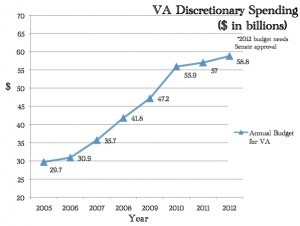WASHINGTON – The Senate is considering cutting $1.25 billion from the president’s 2012 budget request for military construction plans.
This bill would not cut veteran benefits but would slash spending on military construction projects, especially overseas. Sen. Tim Johnson, D-S.D., chairman of the Senate appropriations subcommittee, called the budget proposal a cross-party compromise in a time of belt-tightening. Nevertheless, he said the bill is an “austere” fiscal move. The Senate committee aims to cut 1 percent from the $143 billion the president requested for the Veterans Affairs Department and military construction spending in the year ahead.
Republican Sen. Mark Kirk of Illinois touted subcommittee approval of the leaner bill, but acknowledged concern about cuts in military construction, including reduced funding for 24 construction projects. Kirk foresees debate during a full Senate Appropriations committee hearing on Thursday.
Kirk called the military construction cuts “tough decisions in Guam, Bahrain and Germany” where buildup plans are on the table. A recent report found military buildup in Guam alone could cost at least $7.5 billion through 2016. Those construction projects, dogged by delays since they started in 2004, were the result of a strategic move of Pacific Marines from Japan to Guam, part of the Defense Police Review Initiative.
Kirk also predicted proposed cuts in funding for schools of military children might be talking points when the entire Appropriations Committee meets.
Most of the proposed cuts would affect military construction and family housing — more than$1 billion. The subcommittee justified the proposed 8 percent cut as “progress toward completion of the privatization effort and subsequent reductions in operating expenses,” Johnson said in a statement.
The committee did opt for increased funding in one area – $72 million more toward medical research.
Overall, the bill would provide Veterans Affairs with $58.6 billion in discretionary funding. That’s a $2.3 billion increase from last year’s budget.
The bill would set aside $240 million in contingency funds for veterans as a cushion against an economic downturn.
The subcommittee budget also addresses a growing concern in rural military health care, citing a lack of access to VA-approved health care for veterans who don’t live near a VA hospital. The 2012 budget would provide $250 million for medical care – telehealth and mobile clinics – for veterans in rural areas, as well as for Native American veterans to advance the Rural Health Initiative.
“We still struggle within the VA system to get care for our veterans within their own communities,” Sen. Lisa Murkowski said.
The Alaska Republican said the initiative offers an opportunity for ailing veterans from remote areas to receive treatment closer to home. Easy access would put less strain on veterans’ families. In order to receive VA coverage, some Alaska veterans must travel to Seattle for chemotherapy and cancer treatment, Murkowski said. The veteran health care situation in low population Alaska is representative of a larger trend, according to Murkowski.
To align veteran health care documentation with modern technology, the 2012 budget includes more than $3 billion in funding for Information Technology projects. The goal is to integrate medical records with the Department of Defense and make all veteran health records electronic.

